مشاورت کی دعوت افطار میں سیاسی و سماجی رہنماؤں اورصحافیوں کی شرکت
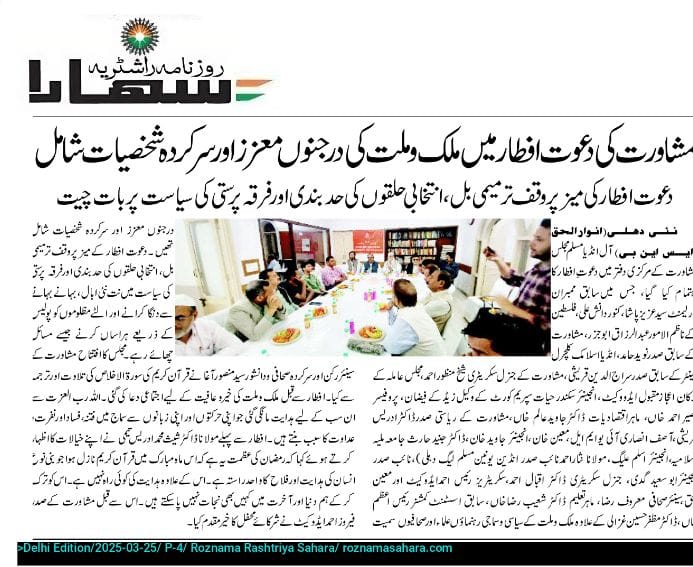
رونامہ راشٹریہ سہارا اردو بتاریخ 25 مارچ 2025
مشاورت کی دعوت افطار میں سیاسی و سماجی رہنماؤں اورصحافیوں کی شرکت
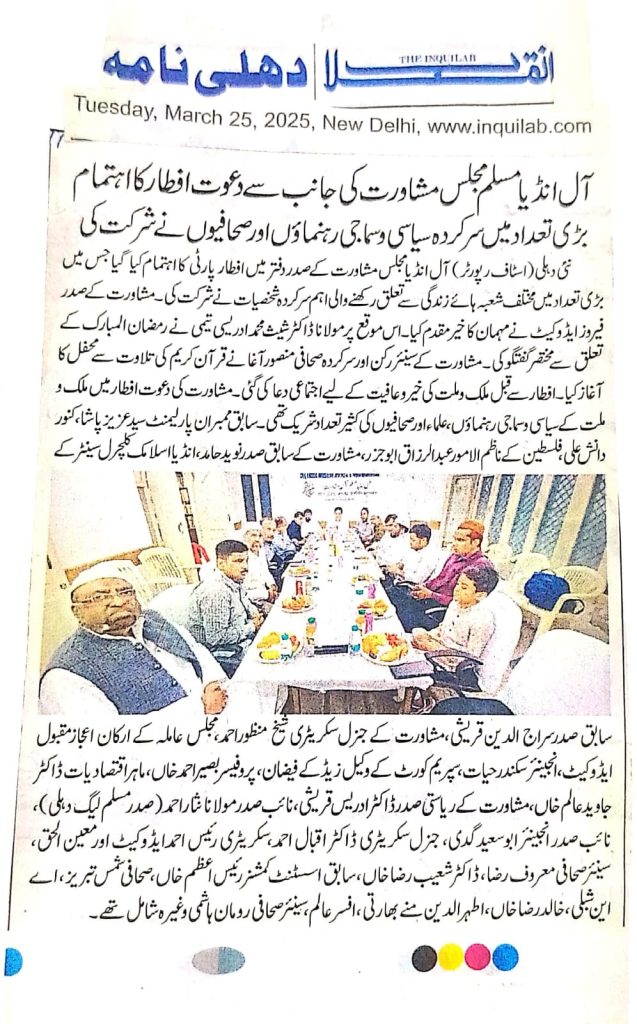
رونامہ انقلاب اردو بتاریخ 25 مارچ 2025
مشاورت کی دعوت افطار میں سیاسی و سماجی رہنماؤں اورصحافیوں کی شرکت
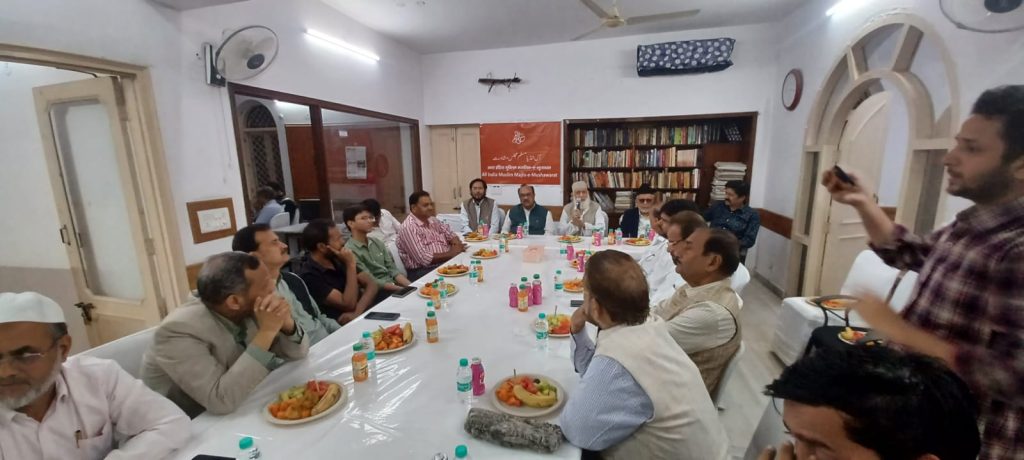
نئی دہلی: رمضان کی عظمت یہ ہے کہ اس ماہ مبارک میں قرآن کریم نازل ہواجو بنی نوع انسان کی ہدایت اور فلاح کاواحد راستہ ہے۔اس کے علاوہ ہدایت کی کوئی راہ نہیں ہے۔اس کو ترک کرکے ہم دنیا اور آخرت میں کہیں بھی نجات نہیں پاسکتے۔ان خیالات کا اظہار اتوار کو یہاں آل انڈیا مسلم مجلس مشاورت کے مرکزی دفتر میں اس کی دعوت افطار کے موقع پر اپنے مختصرخطاب میں مولانا ڈاکٹر شیث محمد ادریس تیمی نے کیا۔اس سے قبل مشاورت کے صدر فیروزاحمدایڈوکیٹ نے شرکائے محفل کا خیرمقدم کیا۔مجلس کا افتتاح مشاورت کے سنیئر رکن اور سرکردہ صحافی و دانشورسید منصور آغا نے قرآن کریم کی سورۃ الاخلاص کی تلاوت اور ترجمہ سے کیا۔افطارسے قبل ملک و ملت کی خیرو عافیت کے لیے اجتماعی دعا کی گئی۔اللہ رب العزت سے ان سب کیلیے ہدایت مانگی گئی جو اپنی حرکتوں اور اپنی زبانوں سے سماج میں فتنہ، فساد اور نفرت و عداوت کا سبب بنتے ہیں۔ مشاورت کی دعوت افطار میں ملک و ملت کے سیاسی و سماجی رہنماؤں،علماء اورصحافیوں کی کثیر تعداد شریک تھی۔سابق ممبران پارلیمنٹ سیدعزیزپاشا، کنور دانش علی،فلسطین کے ناظم الامورعبدالرزاق ابوجزر، مشاورت کے سابق صدرنویدحامد،انڈیا اسلامک کلچرل سینٹر کے سابق صدرسراج الدین قریشی،مشاورت کے جنرل سکریٹری شیخ منظوراحمد، مجلس عاملہ کے ارکان اعجازمقبول ایڈوکیٹ،انجینئرسکندرحیات،فیس گروپ کے چیئرمین مشتاق احمد،سپریم کورٹ کے وکیل زیڈکے فیضان،پروفیسربصیراحمدخاں،ماہراقتصادیات ڈاکٹرجاویدعالم خاں،مشاورت کے ریاستی صدرڈاکٹرادریس قریشی،نائب صدر مولانا نثاراحمد(صدر مسلم لیگ دہلی)،نائب صدر انجینئرابو سعید گدی، جنرل سکریٹری ڈاکٹر اقبال احمد،سکریٹری رئیس احمدایڈوکیٹ اور معین الحق،سینئرصحافی معروف رضا، ماہرتعلیم ڈاکٹر شعیب رضاخاں، سابق اسسٹنٹ کمشنر رئیس اعظم خاں، ملت ٹائمزکے ایڈیٹرشمس تبریز، ہندوستان ایکسپریس کے نیوزایڈیٹر اے این شبلی،بھارت ایکسپریس کے خالدرضاخاں،این ڈی ٹی وی کے اطہرالدین منے بھارتی،زی سلام کے افسرعالم،سینئرصحافی رومان ہاشمی،ٹی وی ۶ کے ڈاکٹرمظفر حسین غزالی، سالارکے عبدالباری مسعوداوردرجنوں معززین ان میں شامل تھے۔ مدعوئین اتنی تعداد میں تشریف لائے کہ نشست گاہ کی ڈیڑھ سو کرسیاں کم پڑگئیں۔یاد رہے کہ آل انڈیا مسلم مجلس مشاورت ملک کی مسلم تنظیموں کا وفاق ہے اوراس وقت ملک کے مسلمانوں میں بہت سے سیاسی و سماجی امورپر شدیدبے چینی پائی جاتی ہے۔مشاورت کی اس دعوت کی میزپروقف ترمیمی بل، انتخابی حلقوں کی حدبندی اورفرقہ پرستی کی سیاست میں نت نئی ابال، بہانے بہانے سے دنگا کرانے اور الٹے مظلوموں کو پولیس کے ذریعے ہراساں کرنے جیسے مسائل چھائے رہے۔
मुस्लिम शिक्षण संस्थानों को निशाना बनाये जाने पर मुस्लिम मजलिसे-मुशावरत की कड़ी प्रतिक्रिया
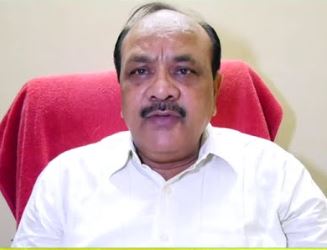
यूएसटीएम के संस्थापक महबूबुल हक की गिरफ्तारी की निंदा, सुप्रीम कोर्ट और राष्ट्रपति से हस्तक्षेप की अपील *प्रतिष्ठित नागरिक की गिरफ्तारी न्याय का उन्मूलन, *प्रगतिशील व्यक्तियों के एक विशेष वर्ग को हतोत्साहित करने की साजिश, *जामिया मिलिया इस्लामिया में अल्पसंख्यक कोटे से छेड़छाड़ भी अस्वीकार्य। नई दिल्ली: भारत के विभिन्न राज्यों में भाजपा सरकारें लगातार मुस्लिम शिक्षण संस्थानों को निशाना बना रही हैं, जो अत्यंत असहनीय और निंदनीय है। ऑल इंडिया मुस्लिम मजलिस-ए-मुशावरत के अध्यक्ष फिरोज अहमद ने आज इस पर गहरी चिंता व्यक्त की। उन्होंने कहा कि असम में विज्ञान और प्रौद्योगिकी विश्वविद्यालय, मेघालय (यूएसटीएम) के संस्थापक और कुलाधिपति महबूबुल हक की गिरफ्तारी राजनीतिक बदले की कार्रवाई और न्याय की खुली पामाली है। इससे पहले जयपुर में मौलाना आजाद यूनिवर्सिटी के अतीक अहमद को परेशान किया गया, उत्तर प्रदेश में ग्लोकल यूनिवर्सिटी की संपत्ति जब्त की गई और रामपुर में मौलाना जौहर यूनिवर्सिटी पर लगातार निर्मम कार्रवाई जारी है। सुप्रीम कोर्ट और भारत के राष्ट्रपति से हस्तक्षेप की मांग करते हुए, मुशावरत के अध्यक्ष ने कहा कि एक सम्मानित नागरिक, प्रसिद्ध बुद्धिजीवी, शिक्षाविद और देश व समाज के निस्वार्थ सेवक की गिरफ्तारी और क़ैद का उद्देश्य समाज में प्रगतिशील व्यक्तियों के एक विशेष वर्ग को हतोत्साहित करना है। उच्च शिक्षा और स्वास्थ्य सेवा के आधुनिक धर्मनिरपेक्ष संस्थानों की स्थापना के प्रयासों को नुकसान पहुंचाया जा रहा है। उन्होंने आगे कहा कि महबूबुल हक की गिरफ्तारी पूरी तरह से राजनीतिक प्रतिशोध की कार्रवाई है। यह बेहद दुर्भाग्यपूर्ण है कि उच्च पदों पर बैठे सांप्रदायिक तत्व NAAC से ‘ए’ ग्रेड प्राप्त संस्थान को कट्टरपंथी और प्रतिगामी करार देकर उनकी प्रतिष्ठा को धूमिल करने का प्रयास कर रहे हैं। इसे किसी भी हालत में बर्दाश्त नहीं किया जाना चाहिए। सुप्रीम कोर्ट के वरिष्ठ अधिवक्ता फिरोज अहमद ने उन रिपोर्टों पर भी चिंता व्यक्त की, जिनमें कहा गया है कि जामिया मिलिया इस्लामिया के नए कुलपति आसिफ मजहर का इस्तेमाल विश्वविद्यालय के अल्पसंख्यक दर्जे को छति पहुंचाने के लिए किया जा रहा है। उन्होंने कहा कि जामिया में लागू अल्पसंख्यक कोटे के साथ किसी भी तरह की छेड़छाड़ बर्दाश्त नहीं की जाएगी। यूएसटीएम चांसलर की गिरफ्तारी से उभरे गंभीर सवाल: पिछले सप्ताह, असम पुलिस ने एक छापेमारी की और फ़र्ज़ी जाति प्रमाण पत्र बनाने के आरोप में यूएसटीएम चांसलर महबूबुल हक को गिरफ्तार किया, जिससे कार्रवाई के पीछे के उद्देश्यों पर गंभीर सवाल उठे। असम पुलिस के विशेष कार्य बल (एसटीएफ) और श्री भूमि जिला पुलिस की एक टीम ने उन्हें गुवाहाटी में उनके आवास से हिरासत में लिया। उनके खिलाफ श्री भूमि जिले में फर्जी जाति प्रमाण पत्र बनाने का मामला दर्ज किया गया था। पिछले साल, मानसून के मौसम में, गुवाहाटी में जलभराव हुआ था, और असम के मुख्यमंत्री हिमंत बिस्वा सरमा ने इसके लिए विश्वविद्यालय को दोषी ठहराया, इसके खिलाफ मामला दर्ज करने का आदेश दिया। सरमा ने इसे “बाढ़ जिहाद” तक करार दिया। इससे पहले, उन्होंने आरोप लगाया था कि गुवाहाटी के आसपास की पहाड़ियों में वनों की कटाई से बाढ़ आई है, जिसके लिए यूएसटीएम जैसे निजी संस्थानों को जिम्मेदार ठहराया गया था। सरमा ने आगे दावा किया कि श्री भूमि जिले के बंगाली मूल के मुस्लिम और यूएसटीएम के संस्थापक महबूबुल हक गुवाहाटी में “बाढ़ जिहाद” में शामिल थे। यूएसटीएम का योगदान और सरकार का निंदनीय रवैया: पूर्वोत्तर भारत में सुपर-स्पेशियलिटी स्वास्थ्य सेवाओं की मांग को देखते हुए, यूएसटीएम 150 सीटों के साथ पी.ए. संगमा इंटरनेशनल मेडिकल कॉलेज और अस्पताल की स्थापना कर रहा है। यह आधुनिक 1,100 बिस्तरों वाला सुपर-स्पेशियलिटी अस्पताल शीर्ष स्तरीय स्वास्थ्य सेवाएं प्रदान करने के लिए उन्नत बुनियादी ढांचे से लैस है। इस अस्पताल से पूर्वोत्तर राज्यों के नागरिकों को उन्नत स्वस्थ सेवा मिलने की उम्मीद है, जिन्हें वर्तमान में विशेष चिकित्सा उपचार के लिए कोलकाता जाना पड़ता है। यह बांग्लादेश, भूटान और नेपाल सहित पड़ोसी आसियान देशों की स्वास्थ्य संबंधी जरूरतों को भी पूरा करेगा, जिससे चिकित्सा पर्यटन को बढ़ावा मिलेगा। हालांकि, असम सरकार यूएसटीएम के संस्थापक डॉ. महबूबुल हक को अनुचित तरीके से प्रताड़ित कर रही है। असम सरकार ने विश्वविद्यालय और डॉ. हक दोनों के साथ खुलकर शत्रुओं जैसा व्यवहार किया और आरोप लगाया है। यहां तक कि यह भी घोषणा की गई कि यूएसटीएम के स्नातकों को असम में नौकरी नहीं दी जाएगी, यह कदम मुख्यमंत्री ने विशुद्ध रूप से राजनीतिक उद्देश्य उठाया है।
Muslim Educational Institutions Targeted – Strong Reaction from AIMMM

Condemnation of USTM Founder Mahbubul Haque’s Arrest, Appeal to Supreme Court and President for Intervention AIMMM condemns the arrest of a distinguished citizen as a travesty of justice and a conspiracy to demoralize progressive circles. Tampering with minority quotas at Jamia Millia Islamia is also unacceptable. New Delhi: BJP-led governments in various states across India are continuously targeting Muslim educational institutions, which is highly intolerable and condemnable. Deep concerns expressed over today by the President of All India Muslim Majlis-e-Mushawarat, Feroz Ahmed. He stated that the arrest of Mahbubul Haque, the founder and chancellor of the University of Science and Technology, Meghalaya (USTM), in Assam is an act of political revenge and a gross miscarriage of justice. Before this, Maulana Azad University’s Atiq Ahmed in Jaipur was harassed, Glocal University’s assets in Uttar Pradesh were seized, and relentless crackdown continues Maulana Johar University in Rampur. Calling for intervention from the Supreme Court and the President of India, the Mushawarat President said that the arrest and detention of a respectable citizen, renowned intellectual, and selfless servant of the nation and the society is aimed at discouraging a particular segment of progressive individuals in society. Efforts to establish modern secular institutions of higher education and healthcare are being undermined. He further stated that Mahbubul Haque’s arrest is purely an act of political vendetta. It is extremely unfortunate that communal elements in high positions are attempting to tarnish the reputation of NAAC ‘A’-graded institutions by labeling them as fundamentalist and regressive. This must not be tolerated under any circumstances. Advocate Feroz Ahmed also expressed concern over reports that the new Vice-Chancellor of Jamia Millia Islamia, Asif Mazhar, is being used to distort the university’s minority status. He stated that any tampering with the minority quota currently in place at Jamia will not be tolerated. Serious Questions Raised Over USTM Chancellor’s Arrest Last week, Assam Police conducted a raid and arrested USTM Chancellor Mahbubul Haque on allegations of forging a caste certificate, raising serious questions about the motives behind the action. A team from the Special Task Force (STF) of Assam Police and the Sri Bhumi district police took him into custody from his residence in Guwahati. A case had been registered against him in Sri Bhumi district, accusing him of creating a fake caste certificate. Last year, during the monsoon season, Guwahati experienced waterlogging, and Assam Chief Minister Himanta Biswa Sarma blamed the university for it, ordering a case to be registered against it. Sarma even termed it “Flood Jihad.” Previously, he had alleged that deforestation in the hills surrounding Guwahati had led to flooding, holding private institutions like USTM responsible. Sarma further claimed that Mahbubul Haque, a Bengali-origin Muslim from Sri Bhumi district and the founder of USTM, was engaged in “Flood Jihad” in Guwahati. USTM’s Contribution and Government’s Unjust Targeting Recognizing the demand for super-specialty healthcare services in Northeast India, USTM is establishing the P.A. Sangma International Medical College and Hospital with 150 seats. This modern 1,100-bed super-specialty hospital is equipped with advanced infrastructure to provide top-tier healthcare services. This hospital is expected to serve citizens of the northeastern states, who currently have to travel to Kolkata for specialized medical treatment. It will also cater to the healthcare needs of neighbouring ASEAN countries, including Bangladesh, Bhutan, and Nepal, contributing to medical tourism. However, the Assam government is unfairly targeting USTM’s founder, Dr. Mahbubul Haque.The Assam government has openly clashed with both the university and Dr. Haque, accusing him. It has even declared that graduates of USTM will not be given jobs in Assam, a move the Chief Minister has undertaken purely for political gain.
مسلم تعلیمی اداروں کو نشانہ بنانے پر مسلم مجلس مشاورت کا سخت ردعمل

یو ایس ٹی ایم کے بانی محبوب الحق کی گرفتاری کی مذمت، سپریم کورٹ اور صدر جمہوریہ سے مداخلت کی درخواست،مشاورت نے معززشہری کی گرفتاری کو انصاف کا خون اورترقی پسند طبقے کا حوصلہ پست کرنے کی سازش کہا، جامعہ ملیہ اسلامیہ میں اقلیتی کوٹے سے چھیڑ چھاڑ بھی ناقابل برداشت نئی دہلی: بی جے پی کی حکومتیں ملک کی مختلف ریاستوں میں مسلم تعلیمی اداروں کومسلسل نشانہ بنارہی ہیں جو انتہائی ناقابل برداشت اور قابل مذمت ہے۔ان جذبات کا اظہار آج آل انڈیا مسلم مجلس مشاورت کے قومی صدر فیروز احمد ایڈو کیٹ نے کیا۔انہوں نے کہا کہ آسام میں یونیورسٹی آف سائنس اینڈ ٹیکنالوجی، میگھالیہ (یو ایس ٹی ایم) کے بانی وچانسلر محبوب الحق کی گرفتاری ایک کھلا سیاسی انتقام اور انصاف کاخون ہے۔اس سے قبل راجستھان میں جے پور کی مولانا آزاد یونیورسٹی کے عتیق احمد کو بھی ہراساں کیا گیا،اترہردیش میں گلوکل یونیورسٹی کے اثاثوں کو ضبط کیا گیا اور رامپور کی مولانا جوہر یونیورسٹی پر اعصاب شکن کارروائیاں جاری ہیں۔ صدر مشاورت نے سپریم کورٹ اور صدر جمہوریہ سے مداخلت کی درخواست کرتے ہوئے کہا ہے کہ ایک معزز شہری،نامورماہرتعلیم اورملک وقوم کے بے لوث خادم کی گرفتاری اور قید کا مقصد معاشرے کے ترقی پسند افراد کے ایک خاص حصے کا حوصلہ پست کرنا ہے۔ اعلیٰ تعلیم اور صحت کے جدید سیکولر اداروں کے قیام کی کوششوں کی حوصلہ شکنی کی جارہی ہے۔انہوں نے کہا کہ محبوب الحق کی گرفتاری خالص انتقامی کارروائی ہے۔ اعلیٰ عہدوں پر بیٹھے فرقہ پرست عناصرکی جانب سے این اے اے سی(NAAC) سے اے گریڈ یافتہ اداروں کے لیے بنیاد پرست اور دقیانوسی جیسے الفاظ استعمال کر کے ان کی شبیہ خراب کرناایک بہت بڑی بدبختی ہے جس کو کسی بھی قیمت پر برداشت نہیں کیا جانا چاہیے۔فیروزاحمدایڈوکیٹ نے جامعہ ملیہ اسلامیہ کے نئے وائس چانسلرآصف مظہر کو جامعہ کا اقلیتی کردار مسخ کرنے کے لیے استعمال کیے جانے کی خبروں پر بھی تشویش کا اظہار کیا ہے اورکہا ہے کہ جامعہ میں نافذالعمل اقلیتی کوٹے سے چھیڑ چھاڑ ہرگزبرداشت نہیں کیا جائیگا۔ یوایس ٹی ایم کے چانسلر کی گرفتاری سے ابھرے سنگین سوالات: آسام پولیس نے پچھلے ہفتے یونیورسٹی آف سائنس اینڈ ٹیکنالوجی، میگھالیہ (یو ایس ٹی ایم) کے چانسلر محبوب الحق کو ذات سرٹیفکیٹ میں جعلسازی کے الزام میں جس طرح چھاپہ مارکر گرفتار کیا،وہ بڑے سنگین سوالات پیداکرتاہے۔ محبوب الحق کو سری بھومی ضلع پولیس اور آسام پولیس کی اسپیشل ٹاسک فورس (ایس ٹی ایف) کی ایک ٹیم نے گوہاٹی میں واقع ان کی رہائش گاہ سے حراست میں لیا تھا۔ ان کے خلاف سری بھومی ضلع میں مقدمہ درج کیا گیا تھا، جس میں ان پر ذات کا جعلی سرٹیفکیٹ بنانے کا الزام عائد کیاگیا ہے۔ گزشتہ سال مانسون میں گوہاٹی میں پانی جمع ہوگیا تھا تو وزیر اعلیٰ ہمنت بسوا شرما نے اس کیلئے یونیور سٹی کو نشانہ بنایا تھا اور یونیور سٹی کے خلاف کیس رجسٹرڈ کرنے کی ہدایت دی تھی۔شرمانے اسے فلڈ جہاد کا نام دیا تھا۔ اس سے پہلے، شرما نے الزام لگایا تھا کہ شہر کو گوہاٹی کے مضافات کی پہاڑیوں میں بڑے پیمانے پر جنگلات کی کٹائی کی وجہ سے سیلاب کا سامنا کرنا پڑا، جس کی وجہ ا نہوں نے یو ایس ٹی ایم جیسے نجی اداروں کو قرار دیا۔ شرما نے دعوی کیا کہ آسام کے سری بھومی ضلع سے تعلق رکھنے والے بنگالی نژاد مسلمان اور یو ایس ٹی ایم کے بانی محبوب الحق گوہاٹی میں ”فلڈ جہاد“میں مصروف ہیں۔ یوایس ٹی ایم کی خدمات اور حکومت کا مذموم رویہ: شمال مشرقی ہندوستان میں سپر اسپیشلٹی صحت خدمات کی مانگ کے ساتھ، پی اے سنگما انٹرنیشنل میڈیکل کالج اینڈ ہاسپٹل، یو ایس ٹی ایم کا ایک کالج، 150 نشستوں کے ساتھ قائم کیا جا رہا،1100 بستروں پر مشتمل جدید ترین سپر اسپیشلٹی اسپتال کا منصوبہ اعلیٰ درجے کی صحت خدمات کے لیے جدید انفراسٹرکچر سے لیس ہے۔یہ سپر اسپیشلٹی اسپتال شمال مشرقی ریاستوں کے شہریوں کو جدید طبی سہولیات فراہم کرتا ہے جنہیں ابھی تک اس کے لیے کولکاتہ جانا پڑتا ہے۔ یہ بنگلہ دیش، بھوٹان اور نیپال سمیت پڑوسی آسیان ممالک کی صحت کی دیکھ بھال کی ضروریات کو پورا کرکے طبی سیاحت میں بھی حصہ ڈالے گالیکن یوایس ٹی ایم کے بانی ڈاکٹر محبوب الحق کو حکومت آسام نہایت بدبختانہ طور پر نشانہ بنارہی ہے۔ یونیورسٹی اور ڈاکٹر محبوب الحق سے حکومت آسام دست و گریباں ہے،اس نے ان پر گوہاٹی میں ’فلڈ جہاد‘ کا الزام لگایا اورکہ اس یونیورسٹی کے فارغین کو آسام میں ملازمت نہیں دی جائے گی اور وزیراعلی نے ایسا صرف اپنے سیاسی اغراض کے لیے کیا۔
تعاون برائے اپیل
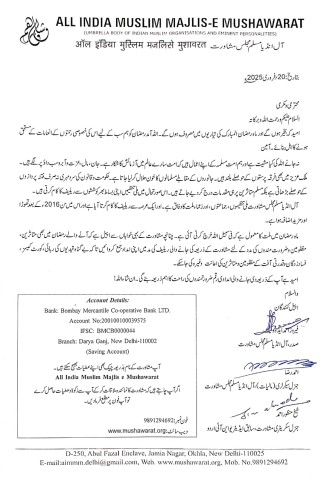
بتاریخ: 20؍فروری2025ء محترمی و مکرمیالسلام علیکم و رحمت اللہ و برکاتہامید کہ بخیر ہوں گے اور ماہ رمضان المبارک کی تیاریوں میں مصروف ہوں گے۔ اللہ آمد رمضان کو ہم سب کے لیے اس کی خصوصی رحمتوں کے انعامات کے مستحق ہونے کا اہل بنائے۔ آمین نہ جانے اللہ کی کیا مشیت ہے اور ہم امت مسلمہ کے اپنے اعمال ہیں کہ امت سارے عالم میں آزمائش کا شکار ہے۔ جان ، مال ، عزت و آبرو سب دائوپر لگے ہیں ۔ ملک عزیز میں بھی فرقہ پرستوں کے حوصلے بلند ہیں۔ جانوروں کے مقابلے مسلمانوں کا خون حلال کرلیا جاتا ہے۔ حکومت و قانون کی سرد مہری نہ صرف فتنہ پردازوں کے حوصلے بڑھاتی ہے بلکہ مسلم متاثرین پر ہی مقدمات درج کر دیے جاتے ہیں ۔ اس صورتحال میں ملی تنظیمیں اپنی بساط بھر کوششوں سے ریلیف کا کام کرتی ہیں۔آل انڈیامسلم مجلس مشاورت ملی تنظیموں ، جماعتوں ، اور زعماء ملت کا وفاق ہے۔ اور ایک عرصہ سے ریلیف کا کام کرتا آیا ہے اور اس میں سن 2016 ء کے بعد تھوڑا اور مزید اضافہ ہوا ہے۔ ماہ رمضان میں ملت کا معمول ہے کہ فی سبیل اللہ خرچ کرتی آئی ہے۔ چنانچہ مشاورت کے بہی خواہاں سے اپیل ہے کہ آنے والے رمضان میں بھی متاثرین، مظلومین و ضرورت مندوں کی مدد کے لئے مشاورت کے ذریعہ کی جانے والی ریلیف کی مد میں اپنی امداد جمع کروائیں تاکہ بے گناہ قیدیوں کی رہائی، کورٹ کیسز ، فسادزدگان و قدرتی آفت کے مظلومین و متاثرین کی اعانت وغیرہ کی جا سکے۔ امید ہے آپ کے ذریعہ دی جانے والی امدادی رقم ضرورتمندوں کی راحت کا اہم ذریعہ بنے گی۔ ان شاء اللہ! والسلاماپیل کنندگان فیروز احمد ایڈووکیٹصدر، آل انڈیا مسلم مجلس مشاورت احمد رضاجنرل سیکرٹری (مالیات) ، آل انڈیا مسلم مجلس مشاورت شیخ منظور احمدجنرل سکریٹری مشاورت، سابق ایڈیٹر یواین آئی اردو Account Details:Bank: Bombay Mercantile Co-operative Bank LTD.Account No:200100100039575IFSC: BMCB0000044Branch: Darya Ganj, New Delhi-110002(Saving Account) آپ مشاورت کے نام بذریعہ چیک بھی اپنے عطیات بھیج سکتے ہیں۔All India Muslim Majlis e Mushawarat اگر آپ چاہتے ہیں کہ مشاورت کا نمائندہ ملاقات کرکے آپ سے زکوۃ و عطیات حاصل کرےتو آپ فون پر مطلع فرمادیں۔ فون نمبر: 9891294692ویب سائٹ: www.mushawarat.org
मुशावरत के पूर्व अध्यक्ष नवेद हामिद का “कायदे मिल्लत पुरस्कार” के लिए चयन
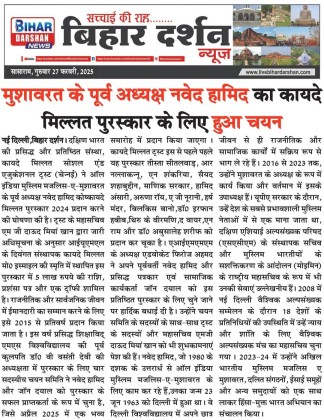
बिहार दर्शन दिनांक 27 फरवरी 2025
مشاورت کے سابق صدرنویدحامد’قائدملت ایورڈ‘کے لیے منتخب
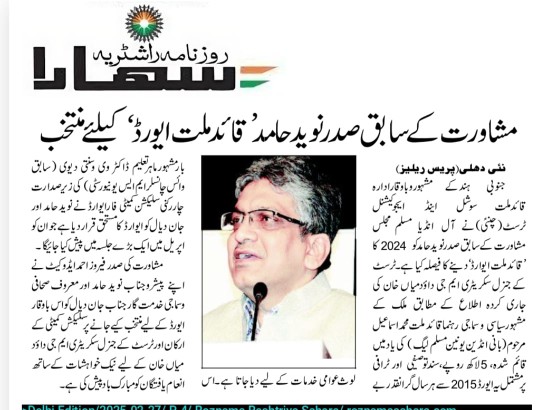
روزنامہ راشٹریہ سہارا اردو بتاریخ: 27 فروری ،2025
मुशावरत के पूर्व अध्यक्ष नवेद हामिद का “कायदे मिल्लत पुरस्कार” के लिए चयन
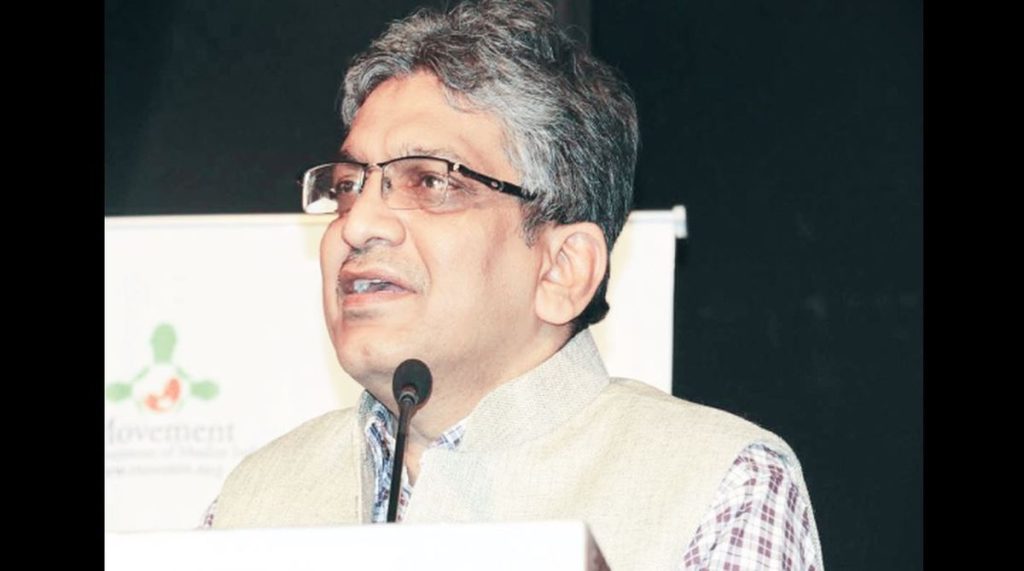
कायदे मिल्लत एजुकेशनल एंड सोशल ट्रस्ट (चेन्नई) की पुरस्कार समिति ने श्री हामिद के साथ श्री जॉन दयाल को भी 2024 के लिए इस प्रतिष्ठित राष्ट्रीय पुरस्कार का विजेता घोषित किया। यह पुरस्कार, जिसमें 500,000 रुपये, प्रमाण पत्र और ट्रॉफी शामिल है, 2015 से प्रतिवर्ष राजनीतिक और सार्वजनिक जीवन में ईमानदारी के लिए प्रदान किया जाता है। नई दिल्ली: दक्षिण भारत की प्रसिद्ध और प्रतिष्ठित संस्था, कायदे मिल्लत सोशल एंड एजुकेशनल ट्रस्ट (चेन्नई) ने ऑल इंडिया मुस्लिम मजलिस-ए-मुशावरत के पूर्व अध्यक्ष श्री नवेद हामिद को “कायदे मिल्लत पुरस्कार 2024” प्रदान करने की घोषणा की है। ट्रस्ट के महासचिव एम जी दाऊद मियां खान द्वारा जारी अधिसूचना के अनुसार, आईयूएमएल के दिवंगत संस्थापक कायदे मिल्लत मुहम्मद इस्माइल की स्मृति में स्थापित इस पुरस्कार में 5 लाख रुपये की राशि, प्रशंसा पत्र और एक ट्रॉफी शामिल है। राजनीतिक और सार्वजनिक जीवन में ईमानदारी का सम्मान करने के लिए इसे 2015 से प्रतिवर्ष प्रदान किया जाता है। इस वर्ष, प्रसिद्ध शिक्षाविद् डॉ वी वसंती देवी (एम.एस. विश्वविद्यालय की पूर्व कुलपति) की अध्यक्षता में पुरस्कार के लिए चार सदस्यीय चयन समिति ने श्री नवेद हामिद और श्री जॉन दयाल को पुरस्कार के सफल प्राप्तकर्ता के रूप में चुना है, जिसे अप्रैल 2025 में एक भव्य समारोह में प्रदान किया जाएगा। कायदे मिल्लत ट्रस्ट इस से पहले पहले यह पुरस्कार तीस्ता सीतलवाड़, आर नल्लाकन्नू, एन शंकरिया, सैयद शहाबुद्दीन, माणिक सरकार, हामिद अंसारी, अरुणा रॉय, ए जी नूरानी, हर्ष मंदर, बिलकिस बानो (शाहीन बाग की दादी), डॉ इरफान हबीब, थिरु के वीरमणि, द वायर (डिजिटल पोर्टल), एन राम (संपादक, द हिंदू) और डॉ अबुसालेह शरीफ को प्रदान कर चूका है। श्री फिरोज अहमद एडवोकेट (अध्यक्ष, एआईएमएमएम) ने अपने पूर्ववर्ती श्री नवेद हामिद और प्रसिद्ध पत्रकार एवं सामाजिक कार्यकर्ता श्री जॉन दयाल को इस प्रतिष्ठित पुरस्कार के लिए चुने जाने पर हार्दिक बधाई दी है। उन्होंने चयन समिति के सदस्यों के साथ-साथ ट्रस्ट के सदस्यों और महासचिव एमजी दाऊद मियां खान को भी शुभकामनाएं पेश की हैं।श्री नवेद हामिद, जो 1980 के दशक के उत्तरार्ध से ऑल इंडिया मुस्लिम मजलिस-ए-मुशावरत के लिए काम कर रहे हैं, का जन्म 23 जून, 1963 को दिल्ली में हुआ था। वे दिल्ली विश्वविद्यालय में अपने छात्र जीवन से ही राजनीतिक और सामाजिक कार्यों में सक्रिय रूप से भाग ले रहे हैं। 2016 से 2023 तक, उन्होंने मुशावरत के अध्यक्ष के रूप में कार्य किया और वर्तमान में इसके उपाध्यक्ष हैं। यूपीए सरकार के दौरान, उन्हें देश के सबसे प्रभावशाली मुस्लिम नेताओं में से एक माना जाता था, दक्षिण एशियाई अल्पसंख्यक परिषद (SACM) के संस्थापक सचिव और मुस्लिम भारतीयों के सशक्तिकरण के आंदोलन (MOEMIN) के राष्ट्रीय महासचिव के रूप में भी उनकी सेवाएं उल्लेखनीय हैं। 2008 में, नई दिल्ली वैश्विक अल्पसंख्यक सम्मेलन के दौरान, 18 देशों के प्रतिनिधियों की उपस्थिति में उन्हें न्याय और शांति के लिए वैश्विक अल्पसंख्यक मंच का महासचिव चुना गया। 2023-24 में, उन्होंने अखिल भारतीय मुस्लिम मजलिस-ए-मुशावरत, दलित संगठनों, ईसाई समूहों और अन्य समुदायों को एक साथ लाकर “हिंसा-मुक्त भारत” अभियान का संचालन किया।
